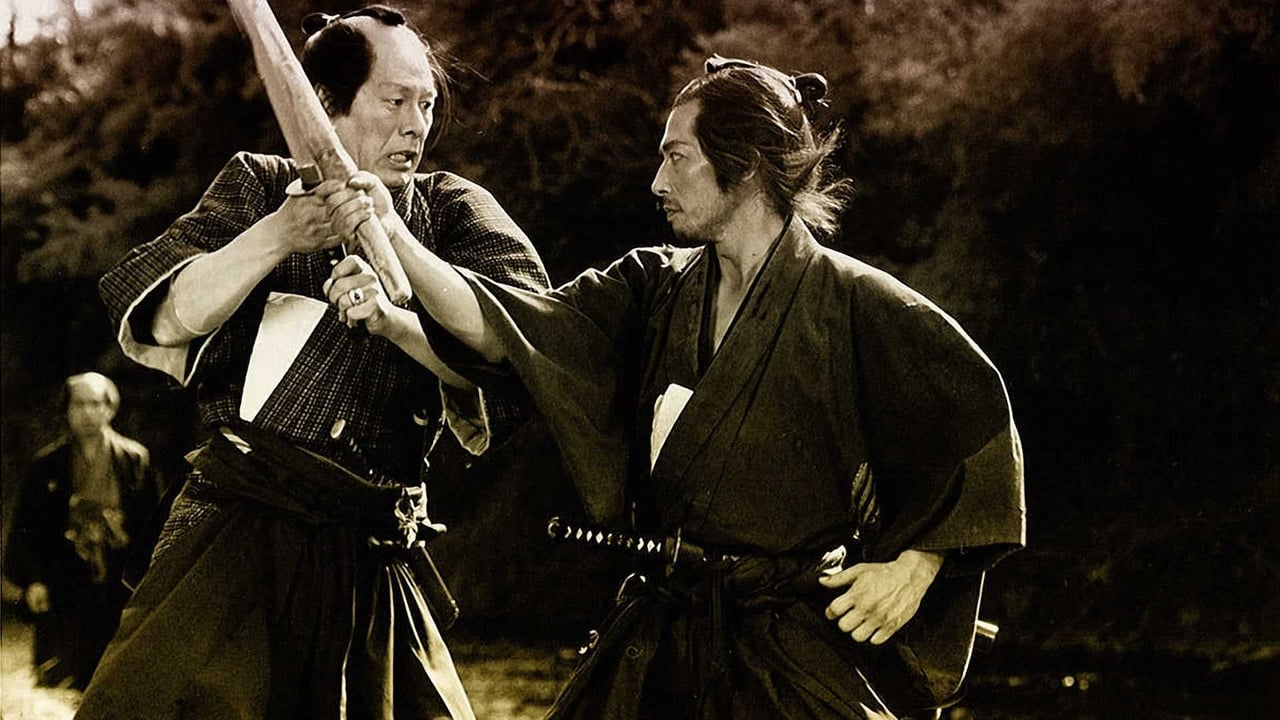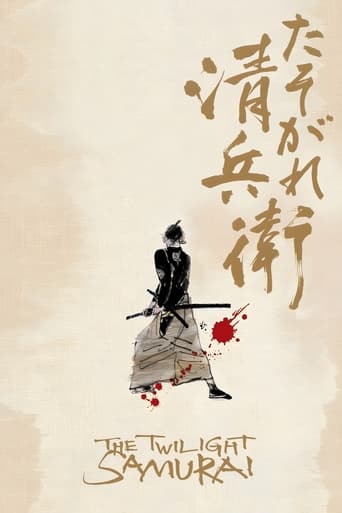

A different way of telling a story
... View MoreSimple and well acted, it has tension enough to knot the stomach.
... View MoreIt's a good bad... and worth a popcorn matinée. While it's easy to lament what could have been...
... View MoreThere is, somehow, an interesting story here, as well as some good acting. There are also some good scenes
... View MoreThe Twilight Samurai is a story, set at the turn of the century, about a petty samurai father, Seibei (Sanada), narrated by his then five-year-old daughter. Seibei's wife died of consumption leaving him to care for his dementia stricken mother, and two daughters. Seibei is of the samurai class though he works as a bureaucrat in the castle stores for a meager salary. IMDb summarizes the film as, "A 19th-century samurai tries to protect a battered wife." This only a minor plot point in the film. We follow him as he experiences tests of character with regard to his desires, his aspirations, and his duties to the clan.Now, this may be an embarrassing testament to my general ignorance of international movies but I mistook this for another film. There is a popular samurai series about Zatoichi (aka "The Blind Swordsman") that follows the adventures of, as you can probably guess, a wandering Samurai who is blind. According to Wikipedia, a total of 26 films were made in the '60's featuring this character. I thought that The Twilight Samurai was that. Clearly, any samurai movie is an action movie, right? Sigh, it sounds even more embarrassing when I write it. In my defense, the film The Blind Swordsman: Zatoichi came out in 2003. The Twilight Samurai is, in fact, a serious and really good drama. It won just about every Japanese film award possible and it's not too surprising.The acting is fabulous, the cinematography is beautiful, and the music and sound are just as good. I'm generally not a fan of narration. "Show me, don't tell," I think when I hear a narrator but I've certainly heard worse narration than that of The Twilight Samurai's. I'm also generally not a fan of children in movies (read: I generally loathe them in movies) but Seibei's daughters are adorable. They play a large part in the motivations of Seibei but they don't play a large part in the movie. They are there just enough to work their way into your heart and make you sympathize with Seibei; one can understand why he wants to stay at home, take care of them, and watch them grow.Overall, The Twilight Samurai is a very good movie. To my chagrin, I went in expecting a hack and slash but was enthralled by the story presented in front of me. It's happy and sad at the same time, and despite being a very Japanese movie, as an American, I found it accessible. By accessible, I mean that some movies use specific of cultural cues that either go over my head or don't jive with my American state of mind. I'll get more into detail about what I mean but it requires giving away some spoilers. This all said, I'd recommend The Twilight Samurai to someone interested in watching a more serious movie about the self and society and family. The only reason why I didn't give it a four out of four is because of some details surrounding the ending (which I will discuss next). Now, mind yourself of spoilers from here on out.I mentioned that The Twilight Samurai was a very Japanese movie. In my experiences with Japanese movies, there are some recurring themes, namely, responsibility to one's duty particularly with respect to community versus the self. In The Twilight Samurai, we see this through Seibei and his interactions with his clan.A friend of Seibei comes back from Edo (the capital city which was later renamed Tokyo) and offers to take him there for a promotion. Seibei respectfully declines saying that his dream is to eventually give up the title of Samurai and become a farmer with his daughters; he doesn't want to rise up in class because he's happy and content. Despite this desire to become a farmer, he is tasked with the job of killing a criminal samurai. The criminal was ordered to commit suicide but didn't, saying, "If you want me dead, you'll have to do it yourself." The criminal samurai is the best one-sword fighter in the clan so it's a high-risk task. Seibei attempts to defer the "honor" or responsibility to someone else but, eventually, accepts because it's his duty to follow the orders of the clan. The film doesn't stop at the "following orders" image. He accepts the task reveals that he intended to provide a route for escape rather execution.A while ago, I reviewed The Shonen Merikansak. It's a movie about a washed-up punk band that reunites. The movie seemed say, "Yeah, I wanna rock, so let's rock." The last shot of the movie, however, undermines that whole message. It changes to "Yeah, I wanna rock, but let's be serious and get back to work after this bit of fun." The Twilight Samurai contains the theme of duty but still gives Seibei the strength to balance responsibility to one's post with responsibility to one's moral code. Seibei explains that he intended on letting the criminal escape to the mountains.Unfortunately, the film takes an easy way out. After all, what would happen if he let the guy escape? What type of repercussions would he face? If he said that he let the guy go, Seibei would totally be executed. Well, we don't have to worry about it because the criminal samurai says, "I will escape after I kill you." Conveniently, Seibei must defend himself and is thus rewarded with money, and his dream wife. Is it a deal breaker? No, but it feels like a little bit of a cop out
... View MoreThis is probably one of the best and touchable samurai movie I ever seen. Last Samurai with Tom Cruise? Forget it. Compare Tasogare is typical hollywoodish piece of sh... Even is nice to see, I have to admit. But Tasogare... That's model of perfection. Camera as perfect as in Blade Runner, music as great and gently as in A Beautiful Mind, Hiroyuki Sanada match this character as much as possible in actor ability is. There is very, very few things to complaint. Too plain story? Maybe, for some, but story in this movie is expressed in best way I ever seen. No spectacular "katana" fights? Ooh, there are plenty in countless another movies, you'll be overfilled of it. This one is about beauty, you probably never seen such way, not power of stunts or CGI. Enjoy it!
... View MoreNominated for an Academy Award for Best Foreign Film, it won almost every one of the more than 3 dozen films it was nominated for.It is a film about duty. Eschewing a night of drinking with his buddies after work, Seibei Iguchi (Hiroyuki Sanada) hurries home to care for his senile mother and his young children. Deep in debt from his wife's illness and death, all the work fell on his shoulders.Seibei's life could be better, but he was acutely aware that he was a low status samurai, and would not subject that on anyone, even one who really loved him like Tomoe Iinuma (Rie Miyazawa).A beautiful film, with outstanding cinematography and music. A real tale of true happiness.
... View MoreTwilight Samurai is one of the most beautiful movies I have ever seen. Absolutely captivating but do not expect the usual samurai movie. Although there are fight scenes this is not what the movie is about. It is a lovingly made story set against the background of the end of the Edo Shogunate and the beginning of the Meiji Restoration. A dramatic and chaotic time in Japanese history. After 250 years of peace under the Tokugawa dynasty, Samurai no longer had their traditional roles of defending their warlord masters to fulfill and often worked in more or less menial roles. Here, Sebei is a clerk in the castle warehouse. This is not the only movie made with similar themes by the director Yoji Yamada, but I fancy it is the best. He made three movies all with similar themes - all set in the 1850s, all involving honourable men doing their duty and all involving the defence of women who had been misused or taken advantage of. This is a lovely lyrical, beautiful movie. I especially love the way Yamada lingers on the tiny details of Japanese life in this period. Its almost like watching an intricately carved Ukiyo-e woodblock print by one of the masters like Hokusei or Hiroshge. Pictures of the floating world indeed!
... View More